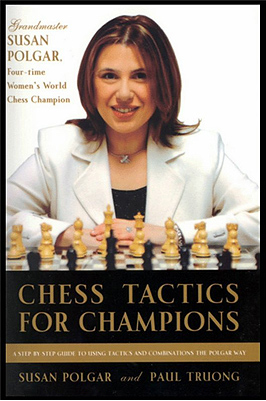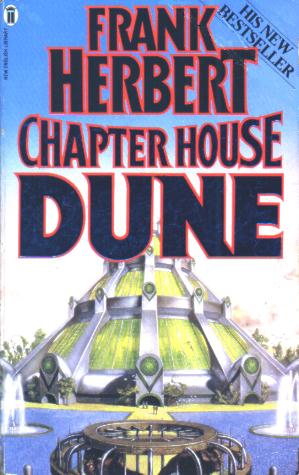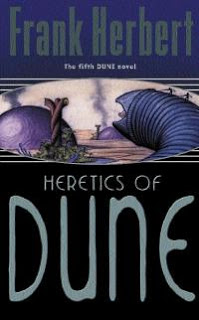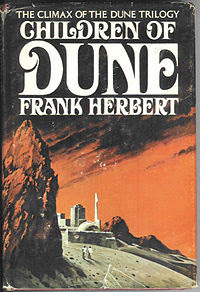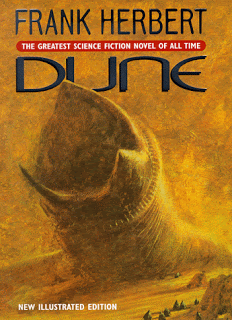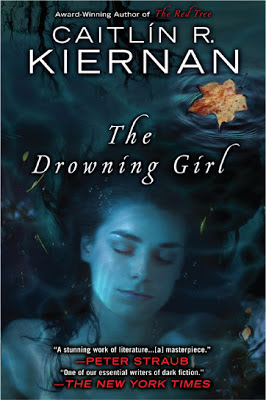
Dune, a mega-classic of sci-fi books, written in 1965 by the ecology obsessed Frank Herbert, tells the story of a future world that is dependent on the substance known as spice, of a vast stellar empire led by an emperor and the noble houses and shaped by religion. Dune is the first in a series of six books, each one increasing the level of "epicness" of the story. There is no way I can do justice to the book in my review, it is that good and that complex. All I can say is that I've read it every ten years from the time I was 15, and every time I read it, I interpret it differently. This also shows how different we are at various ages.
Anyway, I was saying that Frank Herbert was obsessed with ecology. I am saying this after having read all of his books a while ago and noticing the pattern. The Dune Wikipedia article claims that this book was the result of events that started Herbert's interest in ecology, while he was working for the Department of Agriculture, trying to stabilize sand dunes using plants. Herbert is also the author of brilliant books like the Pandora series or like Hellstrom's Hive which, for many reasons, I consider masterpieces as well. However most of his books and short novels feature some interest in ecological systems.
The story is set twenty millennia into the future. As it was written in the sixties, it had to solve the problem of exponential technological advancement that was obvious even then. How can one write a book about the future, when the future moves so fast? Herbert solved it in a simple way: he imagined a world where humans rebelled against the use of intelligent machines, for religious reasons, thus removing computer advancements from the equation. Also, in order to solve the issue of ever evolving weaponry, he imagined a world where energy shields were cheap and small and could be used personally or on buildings or ships; these shields would stop any object or energy moving fast enough. This reduces battles to hand to hand combat, with knives and slow needles that can penetrate the shield. It's not like Herbert had all the answers: there are obvious technological devices that would have rendered this version of a shield useless, as well as clear reasons while perfect control over technology could not have been enforced. But the way he envisioned this future world, where everything important was the human being - as a thinking, feeling, believing creature - made it close to timeless.
Now, the plot is vast and the beauty of the book is in its minutiae, not in the overall story. This has been proven, I think, by the way people have received the 1984 David Lynch film adaptation versus the 2000 version. The first took "poetic license" to change the story and make it more script like, but preserved the feel of the book, with the interior dialogues, the epic scenes and careful attention to minor details. The 2000 adaptation was completely faithful to the book in the way of following it scene by scene, but the lack of attention to punctual details made it unappealing and bland. There is a project called Dune for 2014, maybe that will give us another point of reference. So I will not talk about the plot and let you discover it for yourself. Enough to say that it is a great book.
It is important for me to talk about the difference between my personal interpretation of the book at different ages. When I was 15 I thought it was a glorious story of personal achievement, where Paul Muad'dib and Leto II were becomes gods by the sheer power of their thoughts and feelings. At 25 I thought it was a deep analysis of human interaction, of how logic, emotions and belief clash to mold our beings. And now, at 36, I feel like the book is brilliant, but I can read between the lines, see how the structure of the story was created from various sources; a bit of the mythos has lost its power, but gained more respect. If at 15 I was identifying with Paul and at 25 I was dreaming to become Leto II, now it's easier to me to identify with the likes of Gurney Halleck or even Feyd Rautha Harkonnen. I am not saying that I like them more, I just feel I gained more insight into the other characters. I say it again: Dune is a book of details (without being boring with them).
I cannot end this review without mentioning the Dune video games. I spent many an hour playing the adventure game Dune and many a day playing Dune II, the real time strategy game that was to inspire all others in the future. The game was so primitive that the controls were not designed for ease. Each unit was controlled individually and had very little autonomy, the result being that one rarely had time to blink when many units were constructed. This prompted my father to take me to a mirror and show me my own eyes. They were red and irritated. "Oh", I said, "it's from the spice!".
Review at 45
In between Villeneuve movie adaptations of Dune, it was time for another reread and, amazingly, I got something else out of the book, again! This time I saw through many of the flaws of the book. Small flaws, to be sure, but some contradictory facts like when to unsheathe a crysknife or where the origin of a mind altering substance was and stuff like that.
I also understood why it is so difficult to make an adaptation of the book to movie form. First of all, because the people in the Dune universe are supposed to be superhuman. They remember much, think fast, feel deeply, move fast, after going through harsh training regimens and being subjected to exotic substance, strange rituals and being subject to strong religious and political forces. I can even say now that I think Herbert didn't write well enough to convey what he wanted, as his book is inconsistent in how it portrays the abilities that noble people use at every moment of their existence. Lynch tried to make it work, while all others glossed over it. On paper you are shocked by the way the characters take in the world, observe and analyze minutiae, only to then act with ruthless swiftness. On the screen, you just see normal people in a fantasy world that makes little sense.
The first part of the book is also more consistent that the second. From the moment Paul and Jessica meet the Fremen, everything is done quickly, based on rituals and knowledge that is somehow common to characters from completely different cultures and, when that fails, there are premonitions or instincts that tell them how to act in order to move the story exactly as the author wanted. And failing that, there are always coincidences that help. The Fremen themselves are described in wildly oscillating ways: they are the noble savages, but they also have a very old culture, but they are also violent simpletons that are blindly driven by ritual and implanted religion, but they also have technology, they are honorable, unless they kill stabbing you in the back or in a fit of rage. They are superb fighters, but they are not trained, so Paul can defeat them, but not the super trained Sardaukar. And so on and so on.
At the end, some particular important events are written as happening "off screen", like Herbert wanted to get it over with.
And I understand that, too. The complexity of the story and characters, the careful (superhuman?) effort that must have been necessary to make this work - while writing it on typewriter 70 years ago and also trying to get people from that time to accept it - must have been titanic. Did you know that Dune was the first best seller science fiction novel? Before this book was (repeatedly rejected and only then) published, science fiction was a niche for people to write for themselves and not others.
I am not sure if I will, but I am thinking already to continue to read the entire Dune series of books, not only the mandatory first six, but also those written by Herbert's son - the biography of his father and the collaborations with Kevin J. Anderson.



